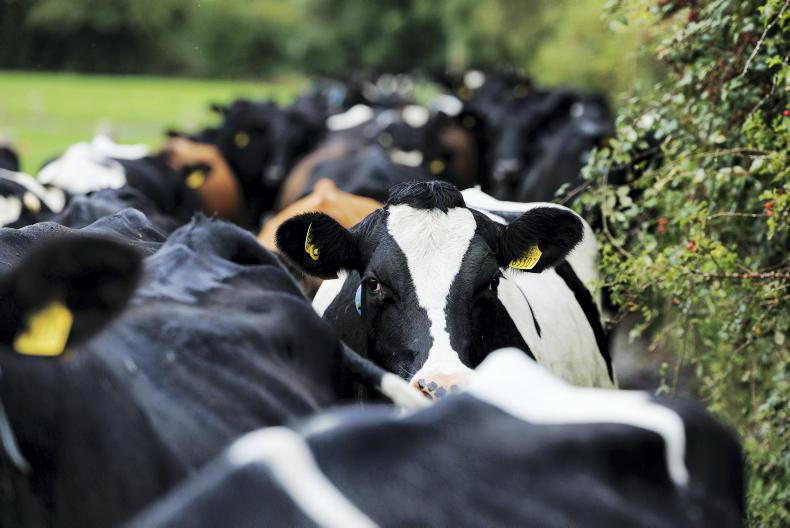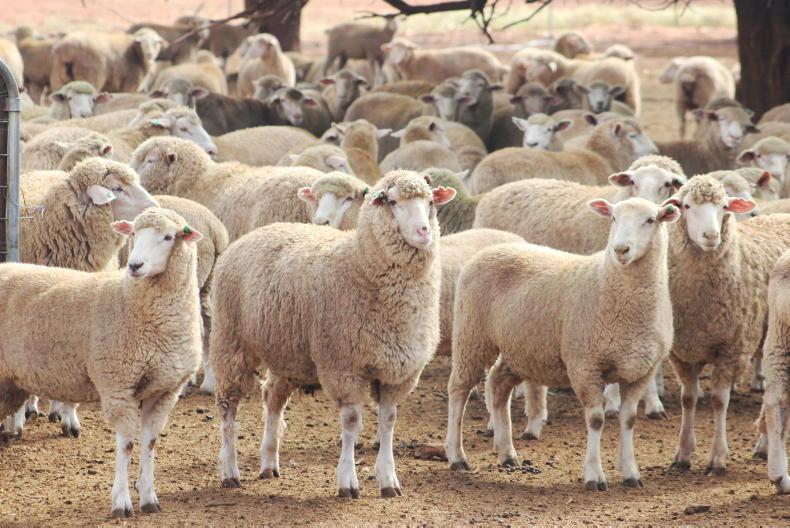The value of Ireland’s agri-food exports grew by 22% last year to reach a record €16.7bn, according to figures released in Bord Bia’s Export Performance and Prospects report for 2022/23.
This puts the sector’s exports almost 30% ahead of 2021 levels.
The rise was driven by higher volumes of beef and dairy, along with global inflation increasing the prices of exports.
Dairy exports grew in value twice as quickly as those in the beef and livestock sector.
Markets
The destination of the sector’s goods saw EU and international markets each accounting for 34% of exports, while the UK followed closely at 32%.
EU exports experienced the largest proportional rise in value over 2022, with 28% of a rise in this class of trade, international markets grew by 23%, as the UK again came third in the rankings to increase by one fifth.
Dairy exports were up by 33% last year, reaching €6.8bn in value to allow the dairy sector to retain its position as the leading element of agri-food exports.
Bord Bia stated that the dairy sector was buoyed by butter and cheese prices being a respective 25% and 24% dearer.
Bump
The meat and livestock sector’s exports got a 15% bump in 2022 to rise above €4bn.
The beef sector slightly outpaced other elements within the meat sector to see its export value upped 18%.
Some 285,000 head of cattle were exported, which was 15% of a rise on the year previous, but, value wise, the increase was only around 8%.
Horticulture and cereals shipments exceeded €300m over the year. Around half of these goods were mushrooms.
US up, China down
Growth occurred in Asian markets, despite a drop in exports to China, as the value of US-destined products was up 40% on 2021.
The value of prepared consumer food sent overseas increased to €3bn, fueled by inflation and the reopening of food services after COVID-19 lockdowns.
Bord Bia noted that high energy and input costs acted to limit growth in this area in UK and European markets.

Dairy exports grew more than those in the meat and livestock sector. \ Donal O'Leary
The Department of Agriculture estimates non-edible agri-food sector exports, which are not included in Bord Bia’s figure, to be worth an additional €2bn to the sector.
This represents a rise on 2021’s figures of just over one fifth.
Value-added meat and seafood shipments were up 30% on 2021 to break the €1bn mark.
The drinks sector underwent an “extraordinary” 25% recovery in value terms to export just under €2bn.
Growth despite global challenges
Minister for Agriculture Charlie McConalogue welcomed the record export takings, saying that the increase was recorded despite issues arising in international markets.
“I’m proud to announce today’s excellent results, which were delivered amid a profoundly challenging year for the sector, most notably the impact of the war in Ukraine, inflationary pressures on producers, and ongoing COVID-19 disruptions to the global supply chain,” Minister McConalogue said.
Against the backdrop of this difficult global trading environment, Ireland has continued to maintain its reputation as a world-class sustainable food producer and supplier, while also successfully securing new business in new markets around the world.
"I would like to congratulate the companies, farmers, fishers and producers who have contributed to this performance, which would not have been possible without the strategic support that Bord Bia provides to the sector,” he said.
Further disruption ahead
Rising exports in a challenging and disruptive year on global markets highlighted the agri-food sector’s resilience, according to Bord Bia CEO Jim O’Toole, who was appointed last year.
“Following two years of profound disruption, 2022 brought a new range of cost and sourcing challenges, making this year’s export performance even more impressive,” the agency’s chief commented.
“Today’s results are testament to the resilience of one of Ireland’s most important export industries.”
Looking to the year ahead, O’Toole stated that further challenges were to be expected, particularly as inflation bites consumers’ pockets around the world.
“As 2023 is predicted to be another disruptive year of economic difficulty and challenging supply chains, Bord Bia will continue to be agile and responsive to client and sector needs in what is likely to be a period of ongoing volatility.
“For Irish food and drink exporters, it will be increasingly important to be aware of how consumers respond to the current cost of living crisis and to position their products accordingly.”
The value of Ireland’s agri-food exports grew by 22% last year to reach a record €16.7bn, according to figures released in Bord Bia’s Export Performance and Prospects report for 2022/23.
This puts the sector’s exports almost 30% ahead of 2021 levels.
The rise was driven by higher volumes of beef and dairy, along with global inflation increasing the prices of exports.
Dairy exports grew in value twice as quickly as those in the beef and livestock sector.
Markets
The destination of the sector’s goods saw EU and international markets each accounting for 34% of exports, while the UK followed closely at 32%.
EU exports experienced the largest proportional rise in value over 2022, with 28% of a rise in this class of trade, international markets grew by 23%, as the UK again came third in the rankings to increase by one fifth.
Dairy exports were up by 33% last year, reaching €6.8bn in value to allow the dairy sector to retain its position as the leading element of agri-food exports.
Bord Bia stated that the dairy sector was buoyed by butter and cheese prices being a respective 25% and 24% dearer.
Bump
The meat and livestock sector’s exports got a 15% bump in 2022 to rise above €4bn.
The beef sector slightly outpaced other elements within the meat sector to see its export value upped 18%.
Some 285,000 head of cattle were exported, which was 15% of a rise on the year previous, but, value wise, the increase was only around 8%.
Horticulture and cereals shipments exceeded €300m over the year. Around half of these goods were mushrooms.
US up, China down
Growth occurred in Asian markets, despite a drop in exports to China, as the value of US-destined products was up 40% on 2021.
The value of prepared consumer food sent overseas increased to €3bn, fueled by inflation and the reopening of food services after COVID-19 lockdowns.
Bord Bia noted that high energy and input costs acted to limit growth in this area in UK and European markets.

Dairy exports grew more than those in the meat and livestock sector. \ Donal O'Leary
The Department of Agriculture estimates non-edible agri-food sector exports, which are not included in Bord Bia’s figure, to be worth an additional €2bn to the sector.
This represents a rise on 2021’s figures of just over one fifth.
Value-added meat and seafood shipments were up 30% on 2021 to break the €1bn mark.
The drinks sector underwent an “extraordinary” 25% recovery in value terms to export just under €2bn.
Growth despite global challenges
Minister for Agriculture Charlie McConalogue welcomed the record export takings, saying that the increase was recorded despite issues arising in international markets.
“I’m proud to announce today’s excellent results, which were delivered amid a profoundly challenging year for the sector, most notably the impact of the war in Ukraine, inflationary pressures on producers, and ongoing COVID-19 disruptions to the global supply chain,” Minister McConalogue said.
Against the backdrop of this difficult global trading environment, Ireland has continued to maintain its reputation as a world-class sustainable food producer and supplier, while also successfully securing new business in new markets around the world.
"I would like to congratulate the companies, farmers, fishers and producers who have contributed to this performance, which would not have been possible without the strategic support that Bord Bia provides to the sector,” he said.
Further disruption ahead
Rising exports in a challenging and disruptive year on global markets highlighted the agri-food sector’s resilience, according to Bord Bia CEO Jim O’Toole, who was appointed last year.
“Following two years of profound disruption, 2022 brought a new range of cost and sourcing challenges, making this year’s export performance even more impressive,” the agency’s chief commented.
“Today’s results are testament to the resilience of one of Ireland’s most important export industries.”
Looking to the year ahead, O’Toole stated that further challenges were to be expected, particularly as inflation bites consumers’ pockets around the world.
“As 2023 is predicted to be another disruptive year of economic difficulty and challenging supply chains, Bord Bia will continue to be agile and responsive to client and sector needs in what is likely to be a period of ongoing volatility.
“For Irish food and drink exporters, it will be increasingly important to be aware of how consumers respond to the current cost of living crisis and to position their products accordingly.”











SHARING OPTIONS